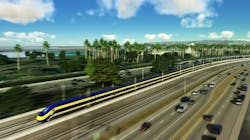The Federal Railroad Administration (FRA) has cancelled its Cooperative Agreement with the California High-Speed Rail Authority (CHSRA) and deobligated the $928,620,000 in funding on May 16. FRA determined CHSRA violated the terms of the FY10 agreement citing repeated failure to submit critical required deliverables, failure to manage and make sufficient progress to complete the project.
FRA Administrator Ronald Batory detailed the FRA's decision in a 25-page letter to CHSRA CEO Brian P. Kelly. The letter says CHSRA "consistently failed to make reasonable progress" on the project and rather than be proactive to remedy issues pointed out by the administration, the authority chose "delay and inaction."
FRA also issued the following statement on its decision:
“After careful consideration, the Federal Railroad Administration (FRA) has terminated Cooperative Agreement No. FR-HSR-0118-12-01-01 (the FY10 Agreement) with the California High-Speed Rail Authority (CHSRA), and will deobligate the $928,620,000 in funding under that agreement. The decision follows FRA’s Notice of Intent to Terminate and consideration of the information provided by CHSRA on March 4, 2019. FRA finds that CHSRA has repeatedly failed to comply with the terms of the FY10 Agreement and has failed to make reasonable progress on the Project. Additionally, California has abandoned its original vision of a high-speed passenger rail service connecting San Francisco and Los Angeles, which was essential to its applications for FRA grant funding. FRA continues to consider all options regarding the return of $2.5 billion in American Recovery and Reinvestment Act (ARRA) funds awarded to CHSRA.”
While the project has been one of the more polarizing in recent memory, tensions between project stakeholders and administration officials began to ramp up following California Gov. Gavin Newsom's State of the State speech in February. The governor used language interpreted as a scaling back of the more than 500-mile project to a single 119-mile Central Valley section.
"The project, as currently planned, would cost too much and take too long," the governor said in his speech before adding, “Right now, there simply isn’t a path to get from Sacramento to San Diego, let alone from San Francisco to LA. I wish there were.”
He later tried to clarify that he remained committed to the project as originally planned.
A few days following the State of the State speech, FRA said it intended to cancel the funds obligated to the project by March 5 and seek recovery of the $2.5 billion in ARRA funds.
CHSRA responded to FRA's original intent to cancel notification with a letter of its own in which is stated Gov. Newsom was fully committed to the project and that the authority was making progress on the project, as well as meeting its commitments under the federal grant agreements.
Now what happens?
Litigation looks like the next step, with Gov. Newsom calling the cancellation of the funding agreement illegal and motivated by political retribution.
The governor's statement following the cancellation of funds said, "The Trump Administration’s action is illegal and a direct assault on California, our green infrastructure, and the thousands of Central Valley workers who are building this project. Just as we have seen from the Trump Administration’s attacks on our clean air standards, our immigrant communities and in countless other areas, the Trump Administration is trying to exact political retribution on our state.This is California’s money, appropriated by Congress, and we will vigorously defend it in court.”
U.S. Sen. Dianne Feinstein (D-CA) called the decision to cancel the funds "deeply concerning" and said she supported Gov. Newsom taking the action to court.
Pro-union groups, such as California Labor Federation and California Building Trades Council issued statements concerned with how the project's funding cancellation would impact state jobs.
U.S. High Speed Rail Association President Andy Kunz said, "Transportation is not, and should not be partisan. Transportation is what makes our economy operate, and enables Americans to get to jobs, visit family and other activities, it enables cargo to get delivered, food to the stores, and more. Anyone making this political is undermining the basic operation of America, going against true America values, undermining our economy, and harming the America people."
American Public Transportation Association (APTA) President and CEO Paul Skoutelas urged the FRA and CHSRA to find a path forward with the project.
"The California High-Speed Rail Project is critically important and has the potential to transform mobility in California and serve as an example of what can and needs to be done in major travel corridors across America," said Skoutelas. "We urge the California High-Speed Rail Authority and the federal government to find common ground to continue to advance and accelerate this important transportation investment. Let’s fulfill a bold vision to create more travel options and restore our preeminence in the world as a leader on transportation.”
Despite what may transpire moving forward, it seems the damage between the FRA and CHSRA has been done.
Administrator Batory concluded his letter to Kelly with the following statement:
"In FRA's view, there is nothing in FRA' s long working relationship with CHSRA to suggest that CHSRA would likely be able to initiate and complete the necessary corrective actions, if given yet another opportunity."
About the Author

Mischa Wanek-Libman
Group Editorial Director
Mischa Wanek-Libman is director of communications with Transdev North America. She has more than 20 years of experience working in the transportation industry covering construction projects, engineering challenges, transit and rail operations and best practices.
Wanek-Libman has held top editorial positions at freight rail and public transportation business-to-business publications including as editor-in-chief and editorial director of Mass Transit from 2018-2024. She has been recognized for editorial excellence through her individual work, as well as for collaborative content.
She is an active member of the American Public Transportation Association's Marketing and Communications Committee and served 14 years as a Board Observer on the National Railroad Construction and Maintenance Association (NRC) Board of Directors.
She is a graduate of Drake University in Des Moines, Iowa, where she earned a Bachelor of Arts degree in Journalism and Mass Communication.
